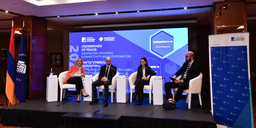
Professor Cooper questioned the quality of the flow of information and the use of social media in journalism.
ANKARA – American journalist and Columbia Business School professor Ann Cooper spoke at TEPAV on Friday, 4 October 2013. Cooper addressed the impact of the social media and the Internet on politics in terms of the changes in the practices of journalism in the US over the last 40-50 years.
During the meeting moderated by TEPAV Russian Center director Dr. Hülya Demirdirek, Cooper cited two studies to illustrate the transformation of journalism practices in the US. The first was Timothy Crouse’s book, Boys on the Bus, about the American journalists who travelled around following candidates during the campaigns in the 1970s and 1980s. Cooper drew attention to the old pattern of journalism in which journalists, predominantly male and middle-aged, followed and listened to politicians, interacted with a few electors, and at the end of the each day sat down and wrote pretty much the same story for their newspapers.
Concerning the present practices of journalism, Cooper spoke of the impacts of digital technologies during the US presidential election and cited the findings of a study conducted by the Shorenstein Center at Harvard's Kennedy School. She said, “First of all, it wasn’t the 'boys on the bus' anymore. Boys and girls, or men and women. A lot of people covering the campaign were much younger than in the past. The most important thing is they were doing journalism differently.” Stressing that today’s journalists used social media, and particularly Twitter extensively, she said that this new pattern of journalism caused a great deal of confusion as it generated a larger and faster flow of information. In this context, she used the statement “one giant tweeting blob” to describe how the study raised criticisms about the quality of the information flowing via Twitter. She stated that in such practice, reporters did not concentrate much on content, the meaning, strive to find facts, answer tough questions, or do political analysis. Although some newspapers and websites still devoted themselves to “confirming the story,” she stressed that this was not really possible with social media.
“We have to learn how to use digital technology”
Adding that the role of the digital technology at the present was undeniable and the fact that the digital technology helped the discovery of different stories in some examples, Cooper stressed that it was necessary to learn how to use it more revolutionary.
After her speech, Cooper answered questions from the audience, and asked questions about social media usage in Turkey.




